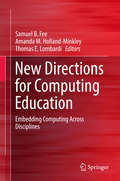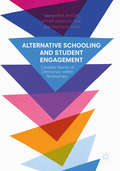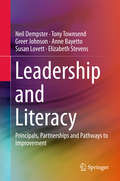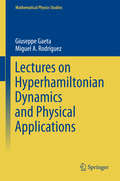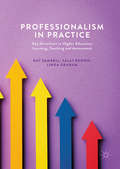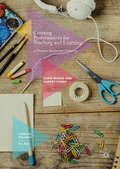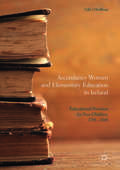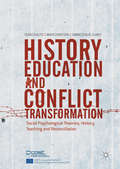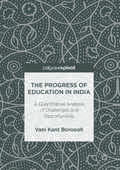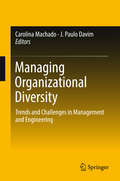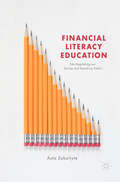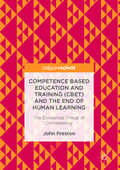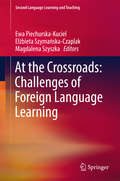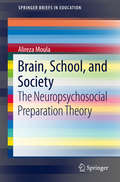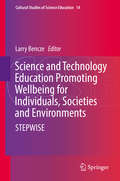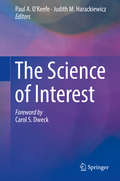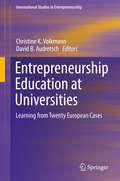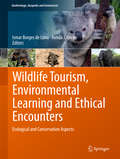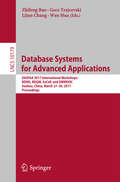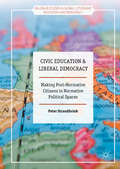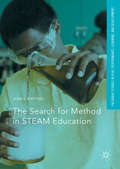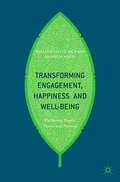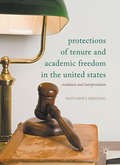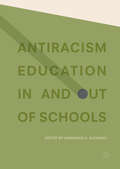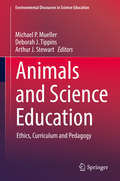- Table View
- List View
New Directions for Computing Education
by Samuel B. Fee Amanda M. Holland-Minkley Thomas E. LombardiWhy should every student take a computing course? What should be the content of these courses? How should they be taught, and by whom? This book addresses these questions by identifying the broader reaches of computing education, problem-solving and critical thinking as a general approach to learning.The book discusses new approaches to computing education, and considers whether the modern ubiquity of computing requires an educational approach that is inherently interdisciplinary and distinct from the traditional computer science perspective. The alternative approach that the authors advocate derives its mission from an intent to embed itself within an interdisciplinary arts and science context.An interdisciplinary approach to computing is compellingly valuable for students and educational institutions alike. Its goal is to support the educational and intellectual needs of students with interests in the entire range of academic disciplines. It capitalizes on students’ focus on career development and employers’ demand for technical, while also engaging a diverse student body that may not possess a pre-existing interest in computing for computing’s sake. This approach makes directly evident the applicability of computer science topics to real-world interdisciplinary problems beyond computing and recognizes that technical and computational abilities are essential within every discipline. The book offers a valuable resource for computer science and computing education instructors who are presently re-thinking their curricula and pedagogical approaches and are actively trying new methods in the classroom. It will also benefit graduate students considering a future of teaching in the field, as well as administrators (in both higher education and high schools) interested in becoming conversant in the discourse surrounding the future of computing education.
Alternative Schooling and Student Engagement: Canadian Stories of Democracy within Bureaucracy
by Nina Bascia Esther Sokolov Fine Malcolm LevinThis book explores the unique phenomenon of public alternative schools in Toronto, Canada and other large urban areas. Although schools of this kind have existed for more than a century, very little has been written about the alternative school movement. These alternatives focus more on child-centered instruction, give many students (and teachers) opportunities to organize the school differently, provide a greater voice for teachers, students, and parents, and engage students far more with experiential learning. When traditional school structures are failing to meet the needs of many children and youth, there is a rapidly growing need for information and discussion about alternatives that will encourage their talents and serve their needs. This book draws attention to the issue of alternative schooling to help make it more accessible to a wider audience.
Leadership and Literacy
by Elizabeth Stevens Greer Johnson Neil Dempster Tony Townsend Anne Bayetto Susan LovettThis book focuses on what school leaders need to know and understand about leadership for learning, and for learning to read in particular. It brings together theory, research and practice on leadership for literacy. The book reports on the findings from six studies that followed school principals from their involvement in a professional learning program consisting of five modules on leadership and the teaching of reading, to implementation action in their schools. It describes how they applied a range of strategies to create leadership partnerships with their teachers, pursuing eight related dimensions from a Leadership for Learning framework or blueprint. The early chapters of the book feature the use of practical tools as a focus for leadership activity. These chapters consider, for example, how principals and teachers can develop deeper understandings of their schools' contexts; how professional discussions can be conducted with a process called 'disciplined dialogue'; and how principals might encourage approaches to shared leadership with their teachers. The overall findings presented in this book emphasise five positive positions on leadership for learning to read: the importance of an agreed moral purpose; sharing leadership for improvement; understanding what learning to read involves; implementing and evaluating reading interventions; and recognising the need for support for leaders' learning on-the-job.
Lectures on Hyperhamiltonian Dynamics and Physical Applications
by Giuseppe Gaeta Miguel A. RodríguezThis book provides the mathematical foundations of the theory of hyperhamiltonian dynamics, together with a discussion of physical applications. In addition, some open problems are discussed. Hyperhamiltonian mechanics represents a generalization of Hamiltonian mechanics, in which the role of the symplectic structure is taken by a hyperk#65533;hler one (thus there are three K#65533;hler/symplectic forms satisfying quaternionic relations). This has proved to be of use in the description of physical systems with spin, including those which do not admit a Hamiltonian formulation. The book is the first monograph on the subject, which has previously been treated only in research papers.
Professionalism in Practice
by Linda Graham Sally Brown Kay SambellThis book acts as a highly practical guide for new and experienced lecturers, learning supporters and leaders in Higher Education; and offers plentiful examples and vignettes showing how learning can be brought to life through activity and engagement. It offers numerous pragmatic illustrations of how to design and deliver an engaging curriculum, and assess students' learning authentically. Sound scholarship and research-informed approaches to Higher Education teaching and learning underpins the myriad accessible and readily recognizable examples of how real educators solve the challenges of contemporary Higher Education. Additionally, guidance is offered on how to present evidence for those seeking accreditation of their teaching and leadership in Higher Education, as well as useful advice for experienced HE teachers seeking to advance their careers into more senior roles, on the basis of their strong teaching and pedagogic leadership. The book will be of great interest to students and researchers working in Education, and will be invaluable reading for both new and experienced lecturers working in HE institutions.
Creating Performances for Teaching and Learning: A Practice Session for Pedagogy (Creativity, Education and the Arts)
by Chris Mcrae Aubrey HuberThis book uses the metaphors of practice spaces and practice sessions to demonstrate the connection between creative and performance practices, and critical pedagogy. It offers a conceptual framework for using performance and creative practices as starting points for developing philosophies and practices of teaching that are grounded in aesthetic, creative, and critical approaches to education. The practice sessions for pedagogy presented include a range of creative endeavours, such as performance workshops, musical routines, crafting practices, and writing. By focusing on the critical function of creative practices, the book emphasizes the ways creativity can reveal the relationship between everyday acts, and social and cultural ideologies and structures. Creative practices also present the opportunity for imagining new, more socially just and inclusive, configurations of these relationships. This book is designed for teachers and students interested in critical pedagogy, performance, and creative educational practices.
Ascendancy Women and Elementary Education in Ireland: Educational Provision for Poor Children, 1788 - 1848
by Eilís O'SullivanThis book outlines the lives of six female members of the Irish Ascendancy, and describes their involvement with educational provision for poor children in Ireland at the end of the long eighteenth century. <P><P>It argues that these women were moved by empathy and by a sense of duty, and that they were motivated by political considerations, pragmatism and, especially, religious belief. The book highlights the women’s agency and locates their contribution in international and literary contexts; and by exploring sources and evidence not previously considered, it generates an enhanced understanding of Ascendancy women’s involvement with the provision of elementary education for poor Irish children. This book will appeal to scholars and researchers in the fields of Education and History of Education. It will also have broad appeal for those interested in Gender and Women’s Studies, in Georgian Ireland and in the history of Ascendancy families and estates.
History Education and Conflict Transformation
by Mario Carretero Charis Psaltis Sabina Čehajić-ClancyThis book is open access under a CC BY 4. 0 license. This volume discusses the effects, models and implications of history teaching in relation to conflict transformation and reconciliation from a social-psychological perspective. Bringing together a mix of established and young researchers and academics, from the fields of psychology, education, and history, the book provides an in-depth exploration of the role of historical narratives, history teaching, history textbooks and the work of civil society organizations in post-conflict societies undergoing reconciliation processes, and reflects on the state of the art at both the international and regional level. As well as dealing with the question of the 'perpetrator-victim' dynamic, the book also focuses on the particular context of transition in and out of cold war in Eastern Europe and the post-conflict settings of Northern Ireland, Israel and Palestine and Cyprus. It is also exploring the pedagogical classroom practices of history teaching and a critical comparison of various possible approaches taken in educational praxis. The book will make compelling reading for students and researchers of education, history, sociology, peace and conflict studies and psychology.
The Progress of Education in India: A Quantitative Analysis of Challenges and Opportunities
by Vani Kant BorooahThis book quantitatively analyses data to demonstrate India's recent progress in the education sector. India, as one of the world's fastest growing economies, currently enjoys what is termed a 'demographic dividend' meaning that, compared to most other countries, it has a relatively young working age population. In order to exploit this advantage, the author argues that India needs to make this young population economically productive through education. The chapters in the book address whether India has succeeded in doing so, both in terms of numbers educated and the quality of their education. The author draws on specialist surveys conducted by India's National Sample Survey Office (NSSO) in 2008 and 2014 which examine the state of education in India.
Managing Organizational Diversity
by J. Paulo Davim Carolina MachadoThis book provides a comprehensive overview of organizational diversity management, intended to help readers implement effective strategies and maximize the value of organizational diversity. Written by experts from a range of disciplines, it presents cutting-edge research and best practices in this field. Further, it addresses the challenges that organizations face in order to successfully manage organizational diversity and presents the application of theoretical concepts. Individual chapters explore topics including workforce diversity, knowledge management, innovation and change, and decision-making. Providing an invaluable resource for students and researchers in the fields of human resource management, industrial engineering and international business, the book will also benefit human resource managers, engineers and economists.
Financial Literacy Education
by Asta ZokaityteThis book explores the issue of consumer financial education, responding to increased interest in, and calls to improve peoples' financial literacy skills and abilities to understand and manage their money. New conceptual frameworks introduced in the book offer academic audiences an innovative way of thinking about the project on financial literacy education. Using the concepts of 'edu-regulation' and 'financial knowledge democratisation' to analyse the financial education project in the UK, the book exposes serious, and often ignored, limitations to using information and education as tools for consumer protection. It challenges the mainstream representation of financial literacy education as a viable solution to consumer financial exclusion and poverty. Instead, it argues that the project on financial literacy education fails to acknowledge important dependences between consumer financial behaviour and the socio-economic, political, and cultural context within which consumers live. Finally, it reveals how these international and national calls for ever greater financial education oversimplify and underestimate the complexity of consumer financial decision-making in our modern times.
Competence Based Education and Training (CBET) and the End of Human Learning: The Existential Threat of Competency
by John PrestonThis book radically counters the optimism sparked by Competence Based Education and Training, an educational philosophy that has re-emerged in Schooling, Vocational and Higher Education in the last decade. CBET supposedly offers a new type of learning that will lead to skilled employment; here, Preston instead presents the competency movement as one which makes the concept of human learning redundant. Starting with its origins in Taylorism, the slaughterhouse and radical behaviourism, the book charts the history of competency education to its position as a global phenomenon today, arguing that competency is opposed to ideas of process, causality and analog human movement that are fundamental to human learning.
At the Crossroads: Challenges of Foreign Language Learning (Second Language Learning and Teaching)
by Ewa Piechurska-Kuciel Magdalena Szyszka Elżbieta Szymańska-CzaplakThis book offers a valuable contribution to the discussion on the complexities of L2 learning processes that pose a challenge to learners. Focusing on the cognitive, affective and socio-cultural perspectives, the papers included provide important insights into the individual's experiences in second language acquisition. This work also addresses social interactions and cultural background, shedding new light on their role in the context in L2 learning processes. It is a valuable resource for anyone interested in understanding the challenges of foreign-language (FL) learning and teaching.
Brain, School, and Society: The Neuropsychosocial Preparation Theory (SpringerBriefs in Education)
by Alireza MoulaThis book reports on a research program designed to construct the basics of a new type of literacy that teaches pupils social problem-solving at individual and collective levels. It is the first of a series of books about a chain of intervention research subprojects started in 2009 teaching pupils basic skills to make well-balanced decisions; to resolve conflicts in a nonviolent manner; and to develop good social relationships and responsibility, critical thinking, and other abilities which give children and young people the tools needed to pursue their options in life. According to the United Nations, there is no systematic program in schools that develops these capacities in pupils. This volume fills the gap by describing successful classroom interventions and by developing a framework for social problem-solving literacy as mandated by the United Nations Child Convention.
Science and Technology Education Promoting Wellbeing for Individuals, Societies and Environments
by Larry BenczeThis edited volume provides theoretical and practical resources relating to the 'STEPWISE' curricular and instructional framework. 'STEPWISE' is the acronym for Science & Technology Education Promoting Wellbeing for Individuals, Societies & Environments. It is a framework for organizing teaching and learning domains in ways that prioritize personal and social actions to address 'critical socioscientific issues' -- that is, controversial decisions by powerful individuals/groups about science and technology (and related fields) that may adversely affect individuals, societies and/or environments. The book contains chapters written by and/or with teachers who have used STEPWISE to guide their instructional practices, as well as chapters written by education scholars who have used a range of theoretical lenses to analyze and evaluate STEPWISE -- and, in several cases, described ways in which it relates to (or could relate to) their practices and/or ways in which the framework might logically be amended. Overall, this book offers educators, policy makers and others with resources useful for arranging science and technology education in ways that may assist societies in addressing significant potential personal, social and/or environmental problems -- such as dramatic climate change, preventable human diseases, species losses, and social injustices -- associated with fields of science and technology.
The Science of Interest
by Paul A. O'Keefe Judith M. HarackiewiczThis exceptional volume analyzes the intricate roles interest plays in cognition, motivation and learning, and daily living, with a special focus on its development and maintenance across life domains. Leading experts discuss a spectrum of interest ranging from curiosity to obsession, and trace its functions in goal-setting, decision-making, self-regulation, and performance. New research refines the current knowledge on student interest in educational settings and the social contexts of interest, with insights into why interest levels change during engagement and in the long run. From these findings, contributors address ways to foster and nurture interest in the therapy room and the classroom, for optimum benefits throughout life. Among the topics covered: #65533; Embedding interest within self-regulation. #65533; Knowledge acquisition at the intersection of situational and individual interest. #65533; The role of interest in motivation and engagement. #65533; The two faces of passion. #65533; Creative geniuses, polymaths, child prodigies, and autistic savants. #65533; The promotion and development of interest. A robust guide to a fascinating area of study, The Science of Interest synthesizes the field's current knowledge of interest and indicates future directions. Its chapters contribute depth and rigor to this growing area of research, and will enhance the work of researchers in education, psychologists, social scientists, and public policymakers.
Entrepreneurship Education at Universities
by David B. Audretsch Christine K. VolkmannThis volume discusses entrepreneurship education in Europe on the basis of in-depth case studies of related activities at twenty higher education institutions. Based on a model of entrepreneurship education, the analysis addresses curricular and extra-curricular teaching, as well as the institutional and stakeholder context of delivering entrepreneurship education within higher educational institutions. The book offers both insightful entrepreneurship teaching practices and a discussion of potential organizational drivers and barriers. Accordingly, it provides a valuable resource for researchers, instructors, and managers of entrepreneurship education alike.
Wildlife Tourism, Environmental Learning and Ethical Encounters
by Ronda J. Green Ismar Borges de LimaThis book outlines the status quo of worldwide wildlife tourism and its impacts on planning, management, knowledge, awareness, behaviour and attitudes related to wildlife encounters. It sets out to fill the considerable gaps in our knowledge on wildlife tourism, applied ecology, and environmental education, providing comprehensive information on and an interdisciplinary approach to effective management in wildlife tourism. Examining the intricacies, challenges, and lessons learned in a meaningful and rewarding tourism niche, this interdisciplinary book comprehensively examines the major potentials and controversies in the wildlife tourism industry. Pursuing an insightful, provocative and hands-on approach, it primarily addresses two questions: ‘Can we reconcile the needs of the wildlife tourism industry, biodiversity conservation, ecological learning and animal ethics issues?’ and ‘What is the Future of the Wildlife Tourism Industry?’. Though primarily intended as a research text, it also offers a valuable resource for a broad readership, which includes university and training students, researchers, scholars, tourism practitioners and professionals, planners and managers, as well as the staff of government agencies.
Database Systems for Advanced Applications: DASFAA 2017 International Workshops: BDMS, BDQM, SeCoP, and DMMOOC, Suzhou, China, March 27-30, 2017, Proceedings (Lecture Notes in Computer Science #10179)
by Wen Hua Lijun Chang Zhifeng Bao Goce TrajcevskiThis two volume set LNCS 10177 and 10178 constitutes the refereed proceedings of the 22nd International Conference on Database Systems for Advanced Applications, DASFAA 2017, held in Suzhou, China, in March 2017. The 73 full papers, 9 industry papers, 4 demo papers and 3 tutorials were carefully selected from a total of 300 submissions. The papers are organized around the following topics: semantic web and knowledge management; indexing and distributed systems; network embedding; trajectory and time series data processing; data mining; query processing and optimization; text mining; recommendation; security, privacy, senor and cloud; social network analytics; map matching and spatial keywords; query processing and optimization; search and information retrieval; string and sequence processing; stream date processing; graph and network data processing; spatial databases; real time data processing; big data; social networks and graphs.
Civic Education and Liberal Democracy: Making Post-Normative Citizens in Normative Political Spaces (Palgrave Studies in Global Citizenship Education and Democracy)
by Peter StrandbrinkThis book explores the inherent tension in civic education. There is a surging belief in contemporary European society that liberal democracy should work harder to reproduce the civic and normative setups of national populations through public education. The cardinal notion is that education remains the best means to accomplish this end, and educational regimes appropriate tools to make the young more tolerant, civic, democratic, communal, cosmopolitan, and prone to engaged activism. This book is concerned with the ambiguities that strain standard visions of civic education and educational statehood. On the one hand, civic-normative education is expected to drive tolerance in the face of conflicting good-life affirmations and accelerating worldview pluralisation; on the other hand, nation-states are primarily interested in reproducing the normative prerogatives that prevail in restricted cultural environments. This means that civic education unfolds on two irreconcilable planes at once: one cosmopolitan/tolerant, another parochial/intolerant. The book will be of significant interest to students and scholars of education, sociology, normative statehood, democracy, and liberal political culture, particularly those working in the areas of civic education; as well as education policy-makers.
The Search for Method in STEAM Education
by Jaime E. MartinezThis book explores various approaches to building a positive interdisciplinary STEAM (science, technology, engineering, arts and math) learning environment, as described by educators across the K-20 educational ladder. Crucial to their success, Martinez finds, is the playful and performatory approach they employ in their teaching. Their practices are creative, improvisational, and inclusive, and are shared in detail through illustrations and interviews. Throughout the book, the author explores a Vygotskian cultural performatory approach to creating interdisciplinary STEAM learning environments, drawing out the history of this approach and its success in fostering collaboration, creativity, leadership, and communication skills, as well as its effect on social, emotional, and cognitive growth in both formal and informal educational settings.
Transforming Engagement, Happiness and Well-Being
by William Scott-Jackson Andrew MayoThis book aims to help leaders maximise the engagement of employees and citizens by exploring the impact of a process of active enthusiasm (PACE). Engagement of employees has long been recognised as a key factor for organisational and national success. Yet, worldwide, engagement levels languish at only 25%. Providing a practical model, developed from in-depth global research, the authors show that engagement is continuous and cannot be assessed by annual surveys. Instead it demonstrates that it is specific to individuals and will only increase if employee perceptions are improved. Readers will discover how the PACE process model can be used to maximise employee engagement through the modification of primary causal factors, and consequently generate direct outputs such as increased productivity and reduced absenteeism. Transforming Engagement and Wellbeing provides an invaluable set of tools to help leaders enthuse their people and to improve individuals’ optimism and propensity for engagement, making it essential reading for academics interested in human resource management, as well as managers, leaders and policy-makers.
Protections of Tenure and Academic Freedom in the United States
by Matthew J. HertzogThis volume examines the historical origins of tenure in higher education. The concept of academic freedom and tenure has been a point of discussion between university faculty and administration since the American Association of University Professors (AAUP) established these two concepts in their 1915 Declaration of Principles on Academic Freedom and Tenure. In this book, the author examines the history of these two issues and how they became an integral part of higher education in the United States. In his detailed analysis, the author provides a review of landmark state and federal court cases and evaluates the subsequent impact of those rulings on academic freedom and tenure.
Antiracism Education In and Out of Schools
by Aminkeng A. AlemanjiThis book explores how antiracism theories can be translated into practice within formal education, as well as in other educational programs outside schools, as very often racism occurs outside the school environment. Combating racism both in and out of school therefore increases the chances of overcoming issues of racism. As racism continues to plague the world, efforts to combat it deserve more attention and diversification across all walks of life. In education, such efforts benefit from being modeled within the framework of antiracism education, rather than simpler multicultural and intercultural theorization and understanding which have proved popular. As such, this book critiques integration and multicultural programs, and instead highlights the advantages of grounding such programs within an antiracist framework. This book demonstrates why and how antiracism education is key to challenging issues of racial injustice at a time when multiculturalism and interculturalism have being proclaimed "dead". It will be highly relevant to researchers and students working in the areas of Education and Sociology, particularly those with an interest in antiracism methodologies.
Animals and Science Education: Ethics, Curriculum and Pedagogy (Environmental Discourses in Science Education #2)
by Michael P. Mueller Deborah J. Tippins Arthur J. StewartThis book discusses how we can inspire today's youth to engage in challenging and productive discussions around the past, present and future role of animals in science education. Animals play a large role in the sciences and science education and yet they remain one of the least visible topics in the educational literature. This book is intended to cultivate research topics, conversations, and dispositions for the ethical use of animals in science and education. This book explores the vital role of animals with/in science education, specimens, protected species, and other associated issues with regards to the role of animals in science. Topics explored include ethical, curriculum and pedagogical dimensions, involving invertebrates, engineering solutions that contribute to ecosystems, the experiences of animals under our care, aesthetic and contemplative practices alongside science, school-based ethical dialogue, nature study for promoting inquiry and sustainability, the challenge of whether animals need to be used for science whatsoever, reconceptualizing museum specimens, cultivating socioscientific issues and epistemic practice, cultural integrity and citizen science, the care and nurturance of gender-balanced curriculum choices for science education, and theoretical conversations around cultivating critical thinking skills and ethical dispositions. The diverse authors in this book take on the logic of domination and symbolic violence embodied within the scientific enterprise that has systematically subjugated animals and nature, and emboldened the anthropocentric and exploitative expressions for the future role of animals. At a time when animals are getting excluded from classrooms (too dangerous! too many allergies! too dirty!), this book is an important counterpoint. Interacting with animals helps students develop empathy, learn to care for living things, engage with content. We need more animals in the science curriculum, not less. David Sobel, Senior Faculty, Education Department, Antioch University New England
